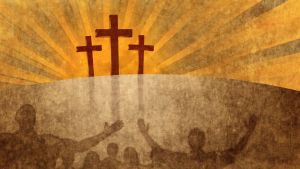Read John 9:1-17
ALSO IN SCRIPTURE
“Whatever is born of God conquers the world. And this is the victory that conquers the world, our faith.” (1 John 5:4 NRSV)
 We, as human beings, have a very difficult time dealing with the unknown. We absolutely desire to be in control and nothing seems more “out of control”, then uncertainty and the great unknown. Right now, our world is going through traumatic and fatal pandemic that is leaving everyone in the dark, confused, isolated, in shock, and wondering why any of this is “allowed” to happen. It is in such moments, especially when we are caught off guard, that we begin to ask the question, “Why?”
We, as human beings, have a very difficult time dealing with the unknown. We absolutely desire to be in control and nothing seems more “out of control”, then uncertainty and the great unknown. Right now, our world is going through traumatic and fatal pandemic that is leaving everyone in the dark, confused, isolated, in shock, and wondering why any of this is “allowed” to happen. It is in such moments, especially when we are caught off guard, that we begin to ask the question, “Why?”
This makes me think of the film, “Miracles From Heaven,” which tells the true story of a young girl who has a rare, serious, and terminal illness that causes her to not be able to digest food. This, of course, leaves her in considerable amounts of pain most of the time. Her life, at the age of 9 (or so), was relegated to bed rest in hospital rooms. In the midst of it, her family was seeking answers as to what they could do in order to cure their daughter of this illness. Yet, doctor after doctor could not even come up with what the illness was, let alone why it was or how they could cure it. One doctor, who was a renowned specialist at the renowned Children’s Hospital in Boston, was able to put his finger on what the disease was; however, with that said, he was also certain there really was no cure for it. All they could do was try to give the little girl pain medicine to keep her comfortable and wait for illness to take it’s inevitable course.
In the midst of their struggle to help their daughter, they turned to their church for spiritual and emotional support. While all certainly intended to provide that, what the family really got was a bucket load of terrible theology. Some congregation members were asking the mother if there was anything she or her husband did, or if there was anything the little girl did, to bring this terrible illness down on them. The pastor, thankfully, was not a part of this…and did try to support the family, however, the response of some of the congregation members was enough to drive the mother further and further away from her faith. What kind of God would punish an innocent little 9 year old because of the sins of her parents? What kind of God would punish a 9 year old girl, whose not even old enough to be held accountable according to Biblical standards, for her own sins?
While, I will not spoil the rest of the film (and I highly recommend that you watch it if you are able), I will say that THEOLOGY MATTERS. We often think that our suffering and struggles are a part of GOD’s PLAN. We will try to comfort people who are struggling by telling them that “they’ll be okay,” that “things will work out in the end,” and that “this is all a part of God’s plan” in order to “test them” and “help them grow.” Or, more judgmental people will try and speculate on what sorts of wrong people did to “deserve” the things that have befallen them. Both lines of theology are appalling, egregious, and dangerous. What kind of God causes people to suffer in order to help them grow? What kind of God blinds people, cripples them, puts them into gas chambers, or kills their family members as a part of “the plan?” What kind of God gives us “what we deserve?” Certainly the not Grace-filled God of Christianity.
Just as Jesus Christ did with his disciples, he is calling us to rethink our theology and to be careful in it. God’s plan is not to hurt, punish, or kill people as some sort of twisted means to an end. That never was God’s plan, nor will it ever be God’s plan. People have articulated it that way, even in the Bible, but only out of ignorance. Overall, the Scripture is consistent in what God’s plan is: to LOVE creation and to be present in relationship with it. That is God’s plan. Things happen, circumstances take us by storm, and life hits us in various ways, but GOD’s LOVE for us and GOD’s PRESENCE with us NEVER changes. God’s plan is to be with us and to be with others through us. That is the plan…and it certainly is a MIRACLE when we acknowledge the plan and LIVE INTO IT.
THOUGHT OF THE DAY
“You know what I noticed? Nobody panics when things go according to plan, even if the plan is horrifying.” – The Joker
PRAYER
Lord, even when things do not go according to plan, you are present with me. Help me to acknowledge that and be a witness to your presence in my life and the lives of others. Amen.



 Have you ever encountered a troll? You may be scratching your head at such a question. You might be wondering, “Why in the world would he ever ask me if I’ve encountered a troll?” After all, surely such a fantastical creature doesn’t exist, outside of fantasy novels and fairy tales such as “Three Billy Goats Gruff.” What an odd, and seemingly trivial question for someone to ask, right?
Have you ever encountered a troll? You may be scratching your head at such a question. You might be wondering, “Why in the world would he ever ask me if I’ve encountered a troll?” After all, surely such a fantastical creature doesn’t exist, outside of fantasy novels and fairy tales such as “Three Billy Goats Gruff.” What an odd, and seemingly trivial question for someone to ask, right?
 I decided to take a short break from the ongoing “God’s People” series this week in order to write what I hope you will find to be a hopeful, encouraging, comforting and inspiring devotion in a time that has been super stressful, panic-laden, and uncertain. The COVID-19 virus has taken the world by storm and caused everyone’s lives to come to a standstill, with no foreseeable end in sight. Reporters and others keep saying we’ll get past this, that we’ll “win the war”, as it were, against the virus; however, those reports are followed by exponentially increased amount of cases each day, and an exponentially increased number of deaths.
I decided to take a short break from the ongoing “God’s People” series this week in order to write what I hope you will find to be a hopeful, encouraging, comforting and inspiring devotion in a time that has been super stressful, panic-laden, and uncertain. The COVID-19 virus has taken the world by storm and caused everyone’s lives to come to a standstill, with no foreseeable end in sight. Reporters and others keep saying we’ll get past this, that we’ll “win the war”, as it were, against the virus; however, those reports are followed by exponentially increased amount of cases each day, and an exponentially increased number of deaths.
 To all of my readers,
To all of my readers,
 Part 239: Stephen. When it comes to Stephen, not a lot is known about him prior to becoming a Christian. One can assume he was Jewish because, unlike “Nicholas of Antioch”, a foreign location was not added to his name. Aside from that, all we have to go on is what is found in Acts 6-7.
Part 239: Stephen. When it comes to Stephen, not a lot is known about him prior to becoming a Christian. One can assume he was Jewish because, unlike “Nicholas of Antioch”, a foreign location was not added to his name. Aside from that, all we have to go on is what is found in Acts 6-7.
 Part 238: Discrimination. Discrimination has been around for as long as humans have been around. Often times it is done unintentionally out of subconscious preference and/or ignorance. Still, there are times when it is being done on purpose in order to keep people in their places.
Part 238: Discrimination. Discrimination has been around for as long as humans have been around. Often times it is done unintentionally out of subconscious preference and/or ignorance. Still, there are times when it is being done on purpose in order to keep people in their places.